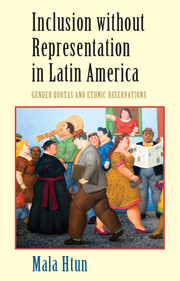Book contents
- Frontmatter
- Dedication
- Contents
- List of Tables and Figures
- Preface and Acknowledgments
- List of Acronyms
- 1 Introduction: Politics of Inclusion in Latin America
- 2 Women, Afrodescendants, and Indigenous Peoples in Elected Office
- 3 Gender Quotas: Why and How?
- 4 Indigenous Reservations and Gender Parity in Bolivia (written with Juan Pablo Ossa)
- 5 Political Inclusion in Colombia
- 6 Brazil: Combatting Exclusion through Quotas in Higher Education
- 7 After Quotas: Women's Presence and Legislative Behavior in Argentina (written with Marina Lacalle and Juan Pablo Micozzi)
- 8 Conclusion
- Appendix 1 Research Trips
- Appendix 2 Mechanisms of Inclusion
- References
- Index
Appendix 1 - Research Trips
Published online by Cambridge University Press: 18 December 2015
- Frontmatter
- Dedication
- Contents
- List of Tables and Figures
- Preface and Acknowledgments
- List of Acronyms
- 1 Introduction: Politics of Inclusion in Latin America
- 2 Women, Afrodescendants, and Indigenous Peoples in Elected Office
- 3 Gender Quotas: Why and How?
- 4 Indigenous Reservations and Gender Parity in Bolivia (written with Juan Pablo Ossa)
- 5 Political Inclusion in Colombia
- 6 Brazil: Combatting Exclusion through Quotas in Higher Education
- 7 After Quotas: Women's Presence and Legislative Behavior in Argentina (written with Marina Lacalle and Juan Pablo Micozzi)
- 8 Conclusion
- Appendix 1 Research Trips
- Appendix 2 Mechanisms of Inclusion
- References
- Index
Summary
This appendix provides additional information about the dates and nature of my research trips and interviews conducted for the project.
Trips
Argentina (1998, 2000, 2009): Interviews with politicians, government officials, judges, lawyers, activists, academics, journalists; lectures at research institutions and national congress; participation in seminars
Bolivia (2005, 2009): Interviews with politicians, government officials, judges, lawyers, activists, academics, journalists, labor leaders, and a German priest; observation of protest marches from El Alto to La Paz
Brazil (1996, 1997, 2000, 2002 [2]): Interviews with politicians, government officials, judges, lawyers, activists, academics, journalists; administered survey to women members of Congress; lectures at national congress and academic institutions; participation in seminars at research institutions, NGOs, and national congress; participant observation in feminist movement campaigns, political meetings, and congressional lobbying; observation of committee meetings in national congress
Chile (1997, 1998 (2), 2012): Interviews with politicians, government officials, lawyers, activists, academics, journalists, religious officials; lectures at research institutions; participation in panels and workshops at academic institutions and nongovernmental organizations (NGOs)
Colombia (2004): Interviews with politicians, government officials, judges, lawyers, activists, academics; observation of plenary sessions and committee meetings of Chamber of Deputies (I had a staff pass); lectures at academic institutions and NGOs
Mexico (1998, 2000 [2], 2001): Interviews with politicians, government officials, lawyers, activists, academics, journalists; observation of political meetings; participation in seminars, panels, and workshops at academic institutions and NGOs
Peru (1997, 2000): Interviews with politicians, government officials, lawyers, activists, academics; participation in seminars at NGOs; participant observation in political meetings
In addition, I made shorter trips to attend conferences and workshops with politicians, government officials, activists, and scholars. These included a 2011 trip to Costa Rica to participate in the Fourth Regional Conference of Afrodescendant Women, two trips to Nicaragua in 1996 and 1998 to participate in regional meetings on women and politics, and a 1999 trip to Venezuela for a workshop on women's leadership. I participated in several conferences and seminars in Washington, DC with women leaders and activists in Latin America organized by the Inter-American Dialogue and the Inter-American Development Bank.
- Type
- Chapter
- Information
- Inclusion without Representation in Latin AmericaGender Quotas and Ethnic Reservations, pp. 173 - 178Publisher: Cambridge University PressPrint publication year: 2016

